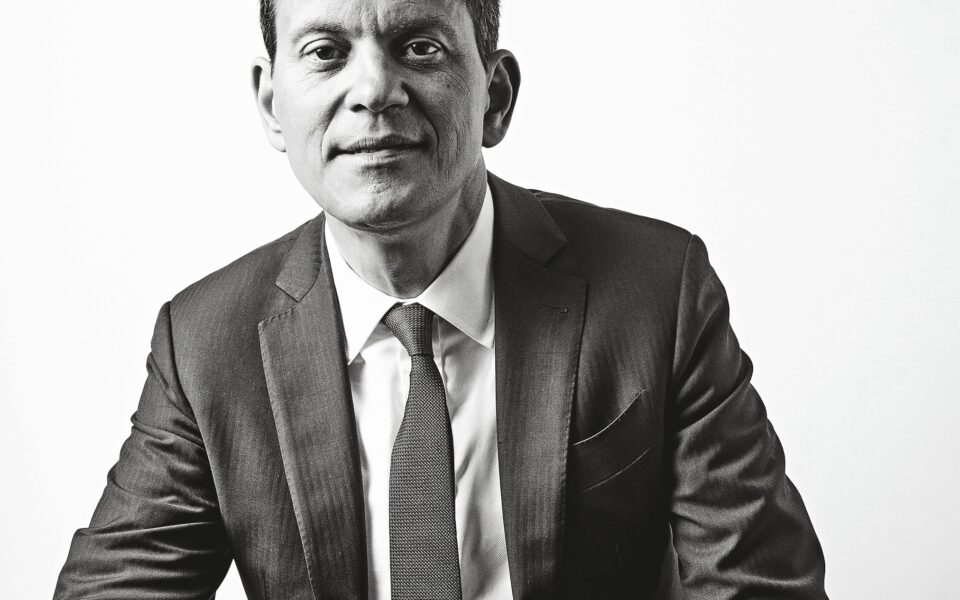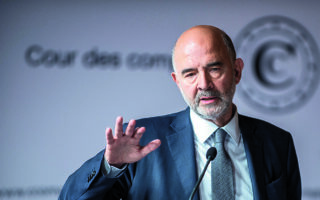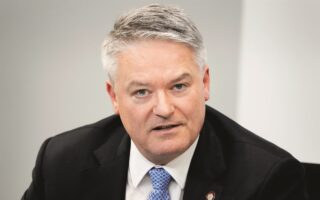Polycrisis due to abuse of power
IRC chief talks to Kathimerini

“I’m an Englishman in New York,” says David Miliband, the former UK foreign secretary (2007-2010) who since 2013 has lived in New York, working as the president and CEO of the International Rescue Committee (IRC). An organization founded at the call of Albert Einstein in 1933, the IRC is helping communities and people in more than 40 countries to cope with humanitarian crises. I ask David Miliband how he feels when he hears Sting’s song of the same name. He laughs and tells me he knows all the lyrics. It’s also fitting that he himself is a “legal alien” in New York, fighting for the rights of illegal aliens and refugees across the globe. Perhaps he’s inspired by another line of the song: “At night a candle’s brighter than the sun.” Miliband recently wrote an essay for the New York Times titled “Our Age of Impunity,” referring to the “Atlas of Impunity” published by Eurasia Group and the Chicago Council on Global Affairs. The Atlas ranks countries according to their tolerance towards all kinds of unlawful behavior. Greece ranks 127th among 197 countries. This is a good mark compared with other countries, but there’s still ground for improvement.
Just after “Our Age of Impunity” was published, Vladimir Putin was indicted by the International Criminal Court for war crimes in Ukraine. And Donald Tramp shouted out on social media that he was about to be arrested. Has the impunity trend already reversed?
Not yet. We are at a very significant moment where abuses of power are a major feature of modern political life. But it’s very important that the rule of law at national and international level applies without fear or favor to everyone.
How about Greece? Should we be satisfied with our ranking?
It’s for Greeks to look at the numbers in the “Atlas of Impunity” and decide whether they’re satisfied. Greece is in the better half of the list. But in some indicators, it is in the middle. Greece does relatively poorly on women’s safety. In other areas Greece actually does overall better than the US.
The International Rescue Committee (IRC) has supported refugees in Greece. Could you say that Greece has responded well in recent years to the ongoing refugee crisis?
Because of its geographic location Greece is bearing a larger proportion of refugees than other parts of Europe. And Europe has responded by offering financial support. There are still very significant issues, especially of child refugees who face some very harsh circumstances. A discussion about Greece’s role in respect of the refugee population has to be situated in a wider discussion about Europe’s response to the refugee challenge.
The former English footballer and BBC “Match of the Day” presenter Gary Lineker said that the language of the UK government about refugees reminded him of 1930s Germany. Do you agree?
I believe very strongly that the UK government’s policy left a lot of refugees in limbo. They have failed to tackle the issue of the people smugglers and they have threatened the UK’s reputation as a law-abiding nation. But I’m not going to get into questions about language.
In 1979 the UK Conservatives unveiled the slogan “Labour isn’t working.” Almost half a century later, should they be forced to answer whether Brexit is working?
Clearly Brexit is not working. It’s very hard to see a single way in which Brexit is working. It’s the implementation of Brexit that has been monstrously mismanaged. Even opponents of Brexit like me say that it didn’t need to be as bad as this. And let’s hope that the common sense that has underpinned the agreement between the current UK government and the EU over Northern Ireland will be followed by a better policy ensuring the UK’s cooperation with the European Union.
The war in Ukraine has driven food and energy prices up, stoking inflation and forcing central banks worldwide to raise interest rates. High interest rates have pushed banks to the brink, as we saw recently. Is that another reason why we badly need a diplomatic solution for the war in Ukraine?
We are probably in a polycrisis. But I think that the failure of regulation of Silicon Valley Bank is not related to the war in Ukraine. On the other hand, if we talk about the concept of polycrisis we can see that the root problem in a number of spheres is the abuse of power. As for Ukraine, it cannot be consistent with international law for one country to seize parts of another country.
I totally agree with you, but let’s try to see how the world looks like from Russia’s point of view. Russia says that Ukraine can never be a member of NATO because such a development would create a security problem for Moscow. Why is this so unacceptable by the West? Why should we insist on NATO engulfing Russia?
I think that’s the wrong question. What Putin said, that Ukraine is not a country, was the foundation of the invasion. The truth is that according to international law Ukraine is a country. Russia signed international agreements stating that Ukraine is a country. The question is not whether or not Ukraine should join NATO. The question is whether or not Ukraine should have the choice about its future.
It’s not only for Ukraine to decide if it wants to become a NATO member. It is also for NATO members to decide whether we accept Ukraine. Why should we insist on that when it is obvious that it is the source of a major geopolitical problem?
No one is insisting on that. Ukraine should have the right to apply to join NATO and NATO should have the right to decide whether to admit it.





